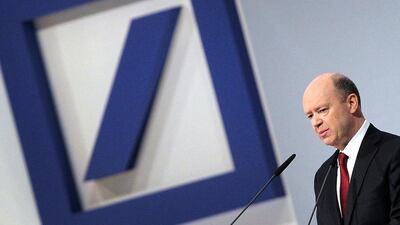The last great banking crisis reached its peak at the end of September 2008, eight years ago this week, after the crash of Lehman Brothers spread panic through the financial markets. Only massive intervention by governments across the globe saved the banking system from meltdown then, but the crisis is still far from over and there is plenty of unfinished business – as we have seen over the past week.
On Tuesday, the shares of Deutsche Bank, Germany's biggest lender and a former pillar of the entire European banking system, hit their lowest level since 1983 amid a fresh crisis triggered by a claim for US$14 billion from the US department of justice (DoJ) for mis-selling mortgage securities during the heady days of the sub-prime boom.
Deutsche, under siege from hedge fund investors, among them George Soros, who have taken short positions in its shares, denied well-sourced stories that it was seeking assistance from Berlin to fight the Americans. As the shares dived again, the bank was forced to issue a statement saying that its chief executive, John Cryan, had “at no point” asked Angela Merkel, the German chancellor, to intervene in the stand-off with the DoJ.
But a report by the German magazine Focus said Ms Merkel had ruled out a Deutsche rescue ahead of 2017's German elections. "This question [of a government rescue] is not on our agenda: Deutsche Bank is determined to meet the challenges on its own," said the bank's chief spokesman.
There have been persistent questions about the bank’s financial health for some time, and even before conformation of the fine, investors were nervy about its capital position. Deutsche made a €6.8bn (Dh27.9bn) loss last year, driven by €12bn of writedowns, litigation, restructuring costs and the prospect of further charges, and that has continued through this year. Its shares have fallen by nearly 60 per cent over the past year and more than 90 per cent from its pre-crisis peak, leaving it with a market capitalisation of €14bn, which is just about what the DoJ reckons Deutsche owes it.
There have been reports that the sale of the bank’s 10.8 per cent stake in the Chinese bank Hua Xia has gone wrong, prompting further doubts about its ability to get through its new crisis without raising more capital – an expensive operation at the current share price, even if it could do it. “The question of a capital increase is currently not on the agenda,” said a bank spokesman last week. No one believed him – of course it’s on the agenda, it’s just a question of when and how much it can raise.
Earlier this year, when Deutsche’s shares began their collapse, Germany’s finance minister, Wolfgang Schäuble, said in an interview with Bloomberg that he had “no concerns about Deutsche Bank”, and Mr Cryan followed up with a statement insisting the bank was “absolutely rock solid”. When banks use language like that, everyone knows they’re in trouble. Eight years ago, the British prime minister Gordon Brown used exactly those words in a vain attempt to head off the crisis, and HBOS and RBS, even as they were going down, were still protesting that they didn’t need new capital either. Deutsche shares have fallen by another 50 per cent since those days; on a market cap basis, it now ranks 78th among global banks, just below the likes of Malaysia’s Public Bank and Brazil’s Itaúsa Investimentos Itau.
The US action raises all sorts of trade issues that a new US president is going to have to become involved in sooner or later. The $14bn claim on Deutsche almost equals the tax claim which European Union authorities have sought to impose on Apple, raising suggestions that we are now into a new game of tit-for-tat. “The DoJ is asking for 10 times more from Deutsche than they asked for from any of its US peers, with no disclosure – it’s extortion,” said one Deutsche shareholder, Davide Serra, the founder of Algebris. “Ultimately I wouldn’t pay it – and I would consider exiting the US.”
And a bitter battle rages between Boeing and Airbus over what constitutes state aid after the World Trade Organization ruled that Airbus’s popular A350, which competes head-to-head with Boeing’s 787 Dreamliner, would never have flown without the “direct and indirect effects” of past EU subsidies – which it declared illegal. Washington hailed the findings as a “sweeping victory” that would redress years of damage to the US aerospace industry from “wrongful” European subsidies.
After this week’s Clinton-Trump debate, no one should be in any doubt that trade wars are going to step up if Donald Trump wins. And the banks may find themselves right in the middle of them. Can Ms Merkel really stand back and let Deutsche go? I think not.
Ivan Fallon is a former business editor of The Sunday Times and the author of Black Horse Ride: The Inside Story of Lloyds and the Financial Crisis.
business@thenational.ae
Follow The National's Business section on Twitter

